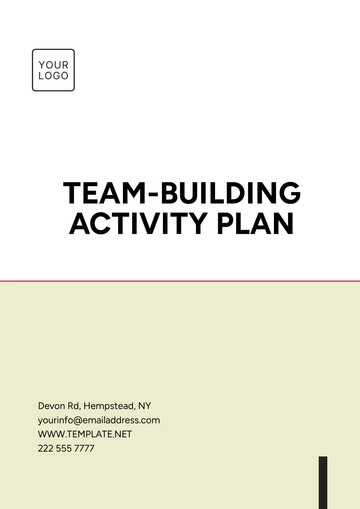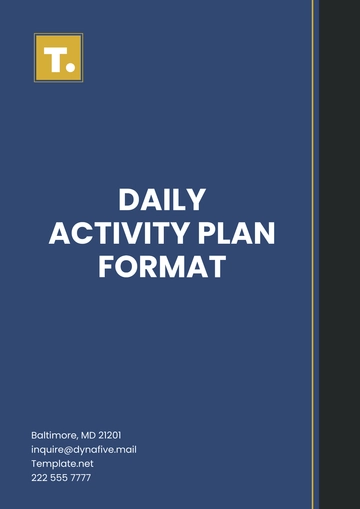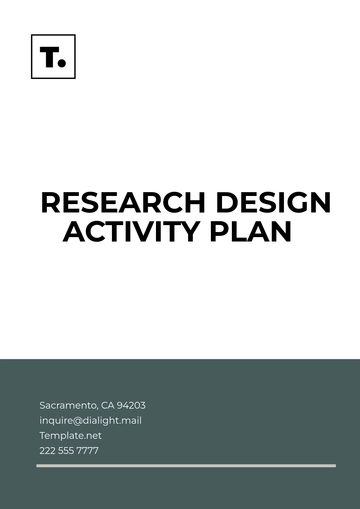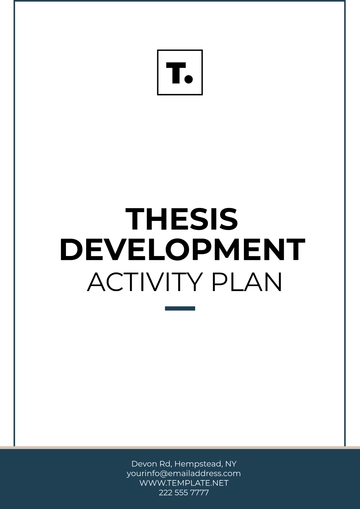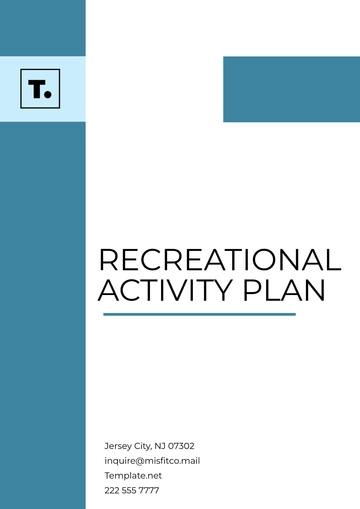Free Research Design Activity Plan
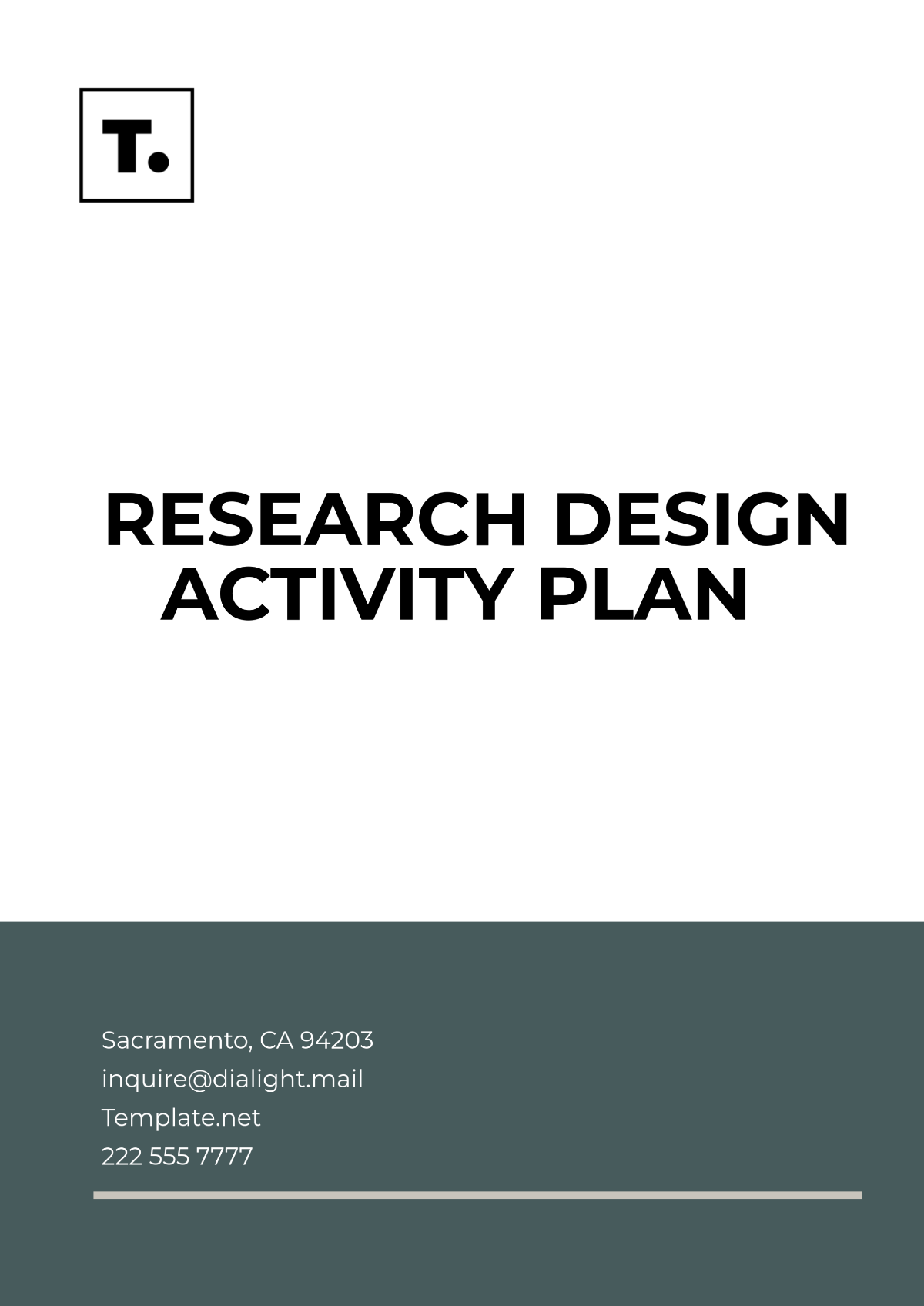
1. Introduction
The May 2050 research plan prioritizes collaboration, innovation, and productivity to meet key goals, tackle contemporary challenges, foster interdisciplinary partnerships, and ensure high-quality contributions through advanced tools and teamwork.
2. Research Objectives
The primary objectives for this month's research activities are aligned with our overarching vision of advancing scientific knowledge and innovation:
Developing Innovative Solutions for Emerging Challenges: This goal centers on addressing current and future problems by leveraging new methodologies, interdisciplinary collaboration, and forward-thinking technological solutions.
Enhancing Collaboration Across Interdisciplinary Teams: Fostering communication and synergy among diverse research groups will be key to creating robust, multifaceted solutions to complex problems.
Publishing High-Quality Research Findings in Recognized Journals: Achieving publication in reputable academic journals is a top priority to share groundbreaking research with the global scientific community.
3. Research Activities
3.1 Weekly Meetings
Weekly meetings are vital for consistent progress, aligning with project goals, discussing challenges, reviewing results, and adjusting strategies, all through structured agendas to enhance collaboration and transparency.
3.2 Data Collection
Throughout May 2050, we will continuously collect accurate and timely data via surveys, interviews, fieldwork, and lab experiments, using advanced tools like AI analytics and automation. Data validation protocols will ensure quality and minimize errors.
3.3 Literature Review
We will conduct a thorough review of recent research to identify knowledge gaps and explore emerging trends, focusing on technology and innovation. This will help us develop hypotheses and design future research based on the latest findings.
3.4 Experimental Trials
Experimental trials will be conducted in controlled environments following a strict methodology to test hypotheses, gather data, and validate models, ensuring high-quality and applicable results.
4. Expected Outcomes
We anticipate that the research activities for May 2050 will yield several significant outcomes, including:
Contributions to Scientific Knowledge: Our research is expected to push the boundaries of existing knowledge, addressing critical gaps and offering novel solutions to contemporary challenges.
Publication in Reputable Journals: High-quality research findings will be submitted for publication in recognized academic journals, contributing to the global body of knowledge and ensuring the dissemination of our work.
Potential for Future Funding Opportunities: Success in achieving our research objectives and producing valuable outcomes may increase our eligibility for future grants and funding opportunities, allowing for the expansion and continuation of research efforts.
5. Challenges and Mitigation Strategies
While we anticipate significant progress, we also recognize several potential challenges that could impact the successful execution of this plan:
Resource Constraints: To mitigate this, we will optimize resource allocation by prioritizing critical tasks and utilizing available resources efficiently. Additionally, we will explore opportunities for external collaboration and funding to supplement internal resources.
Data Accuracy Issues: To ensure the integrity of our findings, we will implement a range of validation techniques, including cross-checking data from multiple sources, using automated tools to flag discrepancies, and applying rigorous statistical analysis to verify results.
Time Management: Time constraints can be a challenge when dealing with complex experiments and interdisciplinary collaborations. Adherence to a well-structured timeline, prioritization of key activities, and regular progress reviews will help keep the project on track. Flexibility will also be incorporated to address any unforeseen challenges that may arise during the research process.
6. Conclusion
The May 2050 Research Activity Plan aims for major research advancements via innovation, interdisciplinary collaboration, and efficient resource management, promising significant scientific and societal contributions and laying the foundation for future success.
- 100% Customizable, free editor
- Access 1 Million+ Templates, photo’s & graphics
- Download or share as a template
- Click and replace photos, graphics, text, backgrounds
- Resize, crop, AI write & more
- Access advanced editor
The Research Design Activity Plan Template, offered by Template.net, is a customizable tool designed to streamline your research process. This downloadable and printable template allows for seamless editing and adaptation to suit your unique project needs. With the flexibility to be fully editable in our AI Editor Tool, it offers a user-friendly way to create a professional research plan that is both efficient and tailored to your specific objectives. Perfect for researchers seeking a structured approach, this template ensures all key activities are organized and easy to manage.
You may also like
- Finance Plan
- Construction Plan
- Sales Plan
- Development Plan
- Career Plan
- Budget Plan
- HR Plan
- Education Plan
- Transition Plan
- Work Plan
- Training Plan
- Communication Plan
- Operation Plan
- Health And Safety Plan
- Strategy Plan
- Professional Development Plan
- Advertising Plan
- Risk Management Plan
- Restaurant Plan
- School Plan
- Nursing Home Patient Care Plan
- Nursing Care Plan
- Plan Event
- Startup Plan
- Social Media Plan
- Staffing Plan
- Annual Plan
- Content Plan
- Payment Plan
- Implementation Plan
- Hotel Plan
- Workout Plan
- Accounting Plan
- Campaign Plan
- Essay Plan
- 30 60 90 Day Plan
- Research Plan
- Recruitment Plan
- 90 Day Plan
- Quarterly Plan
- Emergency Plan
- 5 Year Plan
- Gym Plan
- Personal Plan
- IT and Software Plan
- Treatment Plan
- Real Estate Plan
- Law Firm Plan
- Healthcare Plan
- Improvement Plan
- Media Plan
- 5 Year Business Plan
- Learning Plan
- Marketing Campaign Plan
- Travel Agency Plan
- Cleaning Services Plan
- Interior Design Plan
- Performance Plan
- PR Plan
- Birth Plan
- Life Plan
- SEO Plan
- Disaster Recovery Plan
- Continuity Plan
- Launch Plan
- Legal Plan
- Behavior Plan
- Performance Improvement Plan
- Salon Plan
- Security Plan
- Security Management Plan
- Employee Development Plan
- Quality Plan
- Service Improvement Plan
- Growth Plan
- Incident Response Plan
- Basketball Plan
- Emergency Action Plan
- Product Launch Plan
- Spa Plan
- Employee Training Plan
- Data Analysis Plan
- Employee Action Plan
- Territory Plan
- Audit Plan
- Classroom Plan
- Activity Plan
- Parenting Plan
- Care Plan
- Project Execution Plan
- Exercise Plan
- Internship Plan
- Software Development Plan
- Continuous Improvement Plan
- Leave Plan
- 90 Day Sales Plan
- Advertising Agency Plan
- Employee Transition Plan
- Smart Action Plan
- Workplace Safety Plan
- Behavior Change Plan
- Contingency Plan
- Continuity of Operations Plan
- Health Plan
- Quality Control Plan
- Self Plan
- Sports Development Plan
- Change Management Plan
- Ecommerce Plan
- Personal Financial Plan
- Process Improvement Plan
- 30-60-90 Day Sales Plan
- Crisis Management Plan
- Engagement Plan
- Execution Plan
- Pandemic Plan
- Quality Assurance Plan
- Service Continuity Plan
- Agile Project Plan
- Fundraising Plan
- Job Transition Plan
- Asset Maintenance Plan
- Maintenance Plan
- Software Test Plan
- Staff Training and Development Plan
- 3 Year Plan
- Brand Activation Plan
- Release Plan
- Resource Plan
- Risk Mitigation Plan
- Teacher Plan
- 30 60 90 Day Plan for New Manager
- Food Safety Plan
- Food Truck Plan
- Hiring Plan
- Quality Management Plan
- Wellness Plan
- Behavior Intervention Plan
- Bonus Plan
- Investment Plan
- Maternity Leave Plan
- Pandemic Response Plan
- Succession Planning
- Coaching Plan
- Configuration Management Plan
- Remote Work Plan
- Self Care Plan
- Teaching Plan
- 100-Day Plan
- HACCP Plan
- Student Plan
- Sustainability Plan
- 30 60 90 Day Plan for Interview
- Access Plan
- Site Specific Safety Plan




